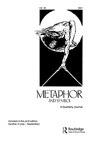“自由的眩晕”:焦虑障碍和隐喻意义制造
IF 3.3
3区 文学
0 LANGUAGE & LINGUISTICS
引用次数: 0
摘要
经历各种形式焦虑症的人在心理治疗中使用的隐喻与经历压力的人使用的隐喻有什么不同吗?我们在动机与沉淀模型(MSM)的帮助下研究了这个问题,MSM是在认知符号学的综合新学科中发展起来的一种意义制造理论。分析了关于焦虑主题的十份心理治疗会议记录样本和关于压力的类似样本,发现压力样本中常规隐喻的比例明显更大,而焦虑样本中创新隐喻的数量略有显著差异。这些结果表明,焦虑障碍或其他形式的适应不良焦虑的生活经历影响隐喻意义的形成,并表现为自发隐喻的使用。此外,作为对该主题的概念和实证调查的结果,我们提出了隐喻概念的新的理论和操作定义。本文章由计算机程序翻译,如有差异,请以英文原文为准。
“Dizziness of Freedom”: Anxiety Disorders and Metaphorical Meaning-making
ABSTRACT Would metaphors used in the context of psychotherapy by people who experience various forms of anxiety disorders differ from those used by people who experience stress? We investigated this question with the help of the Motivation & Sedimentation Model (MSM), a theory of meaning-making developed within the synthetic new discipline of cognitive semiotics. The analysis of a sample of ten transcripts of psychotherapy sessions concerning the topic of anxiety, and a comparable sample concerning stress, showed a significantly stronger proportion of conventionalized metaphors in the stress sample, and a marginally significant difference in the number of innovative metaphors in the anxiety sample. These results suggest that lived experience of an anxiety disorder or another form of maladaptive anxiety affects metaphorical meaning-making, and manifests itself in spontaneous metaphor use. Furthermore, as a result of the conceptual and the empirical investigations of the topic, we propose novel theoretical and operational definitions of the notion of metaphoricity.
求助全文
通过发布文献求助,成功后即可免费获取论文全文。
去求助
来源期刊

Metaphor and Symbol
Multiple-
CiteScore
2.90
自引率
0.00%
发文量
23
期刊介绍:
Metaphor and Symbol: A Quarterly Journal is an innovative, multidisciplinary journal dedicated to the study of metaphor and other figurative devices in language (e.g., metonymy, irony) and other expressive forms (e.g., gesture and bodily actions, artworks, music, multimodal media). The journal is interested in original, empirical, and theoretical research that incorporates psychological experimental studies, linguistic and corpus linguistic studies, cross-cultural/linguistic comparisons, computational modeling, philosophical analyzes, and literary/artistic interpretations. A common theme connecting published work in the journal is the examination of the interface of figurative language and expression with cognitive, bodily, and cultural experience; hence, the journal''s international editorial board is composed of scholars and experts in the fields of psychology, linguistics, philosophy, computer science, literature, and media studies.
 求助内容:
求助内容: 应助结果提醒方式:
应助结果提醒方式:


